Recently our Muslim brethren at the end of the month of fasting celebrated the festival locally known as, “ Pernāl” in Tulu as well as Byāri languages. The Pernāl is a big day or day of festival for the Muslims.
Besides Muslims, Saint Thomas Christians of Kerala have also adopted the word for “Pindikuthi Perunnāl”, a festival celebrated by their community on January 6th every year. Incidentally the term “ pindikuthi” refers to the trunk of banana plant with torches/lamps pierced on it and installed in front of houses during the celebration of the festival. The term Perunnāl is equivalent of the Tulu/Byari word Pernāl.
The word Pernāl is interesting from the viewpoint of evolution of Dravidian languages and culture. The etymology of the word can be traced to various Dravidian languages as it is also found in Malayalam and Tamil languages as “Perunnāl”.
Peru=big, great; large. nāl= day. Thus, the word Pernāl means a big day ; a festival; or a day of festival
The word “peru” is common in Tulu place names such as: Peruvayi, Perla, Perne, Periadka, Peramoger and so on. In daily usage we can find: “permari”(= big snake or python), “piriya” (=costly; an item of big value), “periyappe” (=literally: big mother; actually refers to mothers elder sister), “periyamme” ( fathers elder brother) etc. However, strangely the suffix “nāl” is missing in current usage of Tulu language. It might have been lost during the process of lingual evolution in Tulu. Contrastingly, we find the word nāl still prevailing in the neighborly Kannada language in the form of nāle (=tomorrow) and nāliddu (=day after tomorrow) etc.
In the current usage of Tulu language, the word Pernāl, is used exclusively for the Muslim festival. For other festivals, Tulu people have adopted an alternate word “parba” apparently derived from Prakrit that prevailed in the region during early centuries of the Common Era. (The Kannada equivalent is “habba”). The word “parba”, prevails in Sanskrit in the form of “parva”.
In this context, it reminds me another Dravidian word “palli”. The word palli originally represented a congregation or a group of people assembled together or a village center. The word palli also existed in old Kannada. The modern Kannada equivalent of palli is halli, the village. Muslims settled in the coastal region probably around 7th century CE onwards, adopted the word palli to represent mosques where community gatherings were held for prayer etc. After wards, the word palli was used exclusively for mosques and other implications were discontinued.
The short note is an example just to show how changes takes place in the word usages with passage of time due to prevailing environmental conditions.
R.



No comments:
Post a Comment